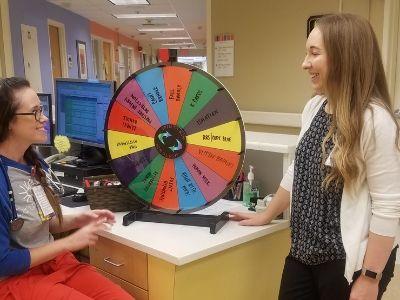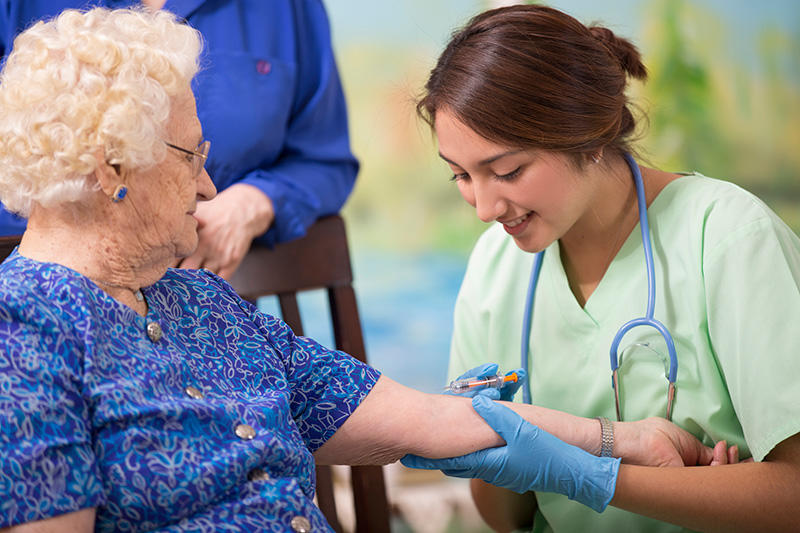Featured
Tags
Share

While Emily Nicoletti, MSN, RN, was always aspired to be around children, her work as a pediatric nurse involves a lot more than holding newborn babies. Pediatric nurses use their skills to care for children from infancy through late teen years, as well as their families. She is a staff nurse on a step-down Intensive Care Unit (ICU).
A two-time Chamberlain alumna, she graduated with her Bachelor of Science in Nursing (BSN) from the St. Louis campus in 2013 and earned her Master of Science in Nursing (MSN) online in 2017.
“I absolutely loved my experience at Chamberlain,” Emily said. “I actually started out at another school before I came here, and it was such a difference going from a huge university where you don’t really know who you’re going to school with to a place where you’re surrounded by 75 of your closest friends. We got great support from all the staff here, too.”
We recently spoke with Emily to learn more about the ins and outs of pediatric nursing.
Tell us about your nursing journey!
I have always had a desire to work with kids. I originally went to college as a pre-med student, but after realizing what doctors do versus what nurses do, I quickly changed my mind and pursued nursing.
While attending Chamberlain, I worked for a home care company as a caregiver. After I graduated, I transitioned to a role as a nurse caring for adults. Soon after, I switched to a pediatric-focused home care company and began taking care of kids with complex medical needs. I worked within this role for a little over a year and then advanced into a management role where I coordinated and managed care.
I later decided to transition to an acute care facility, and that’s where I am today.
What’s a typical day like for you?
The step-down ICU is between the ICU and general medical surgery in terms of how sick or unstable the patients are. Usually, the children we see are from the ICU, but may also come straight to our unit.
I see a very wide range of patients and diagnoses. We take care of children with ventilators and those that just completed brain surgery. We have patients who are there for 24 hours in observation and patients who are there for several months before moving to a home or a rehab facility.
Some of the regular tasks we do include taking vital signs, performing thorough assessments, passing medications and performing daily care for patients. We often have patients that have tracheostomies and gastrostomy tubes, so we provide feedings and take care of those different apparatuses.
As we treat our patients, we interact with them at their developmental level – after all, speaking to a 2-year-old is different than speaking to a 10-year-old, in terms of what you say and how you say it.
We also do a lot of care planning and education for families. One of the biggest things in pediatrics is providing education – teaching patients and families how to take care of their loved ones once they get home.
I work in a specific unit of a specific hospital, but a lot of these things are really basic principles of pediatric nursing.
What’s your favorite thing about your specialty?
My favorite thing is working with the kids. I’ve always had a passion for working with children. I think it’s my true calling and I wouldn’t change it for anything.
What are some challenges you face?
When people think pediatrics, they think you’re strictly taking care of children. The truth is that the family is just as much your patient as the patient themselves.
Taking care of families can really be challenging. They’re under a lot of stress and they have different personalities. As a pediatric nurse, your job is to help them understand what is going on with their child and provide them with the education that they need to take care of their child once they go home.
Another challenge is that, with patients who stay for a long time, sometimes the families are not able to be there with their child as much as they’d like. Maybe they’re from out of town or need to return to work. In situations like that, it’s harder to do all the teaching we need to do. At the same time, we work hard to build as strong of a relationship with the family as we can because we want them to know and understand that their child is well taken care of when they’re not there.
What would make someone a good fit for your specialty?
To be successful in pediatrics, I think you really need to be kid-friendly. You need to be upbeat and able to look at the positive things. The kids you care for need to be able to trust you – that means you need to be able to take nursing to a child’s level, explain to them what’s going on in their language, and maybe even listen to their teddy bear before you listen to them.
Any advice for those considering the specialty?
If you want to be a pediatric nurse, work with children as much as you can. Experience is key. Get to know children, their development, how to relate to them. Learn how to get on their level and really understand where they’re coming from – why they’re upset and why they’re happy and what you can do to help them.
Emily was able to use the skills she learned while pursue her Bachelor of Science in Nursing degree to build a solid foundation for her work in pediatric nursing. Since we last spoke, she’s moved into a leadership role and hopes to facilitate process improvement strategies. Does pediatric nursing interest you? Learn more about Chamberlain’s 3-Year BSN program to help build your foundation.
By Charlene Decrease
More from Careers
Request More Information
To receive the Chamberlain University Program Guide, including associated career paths, please select a program of study.






